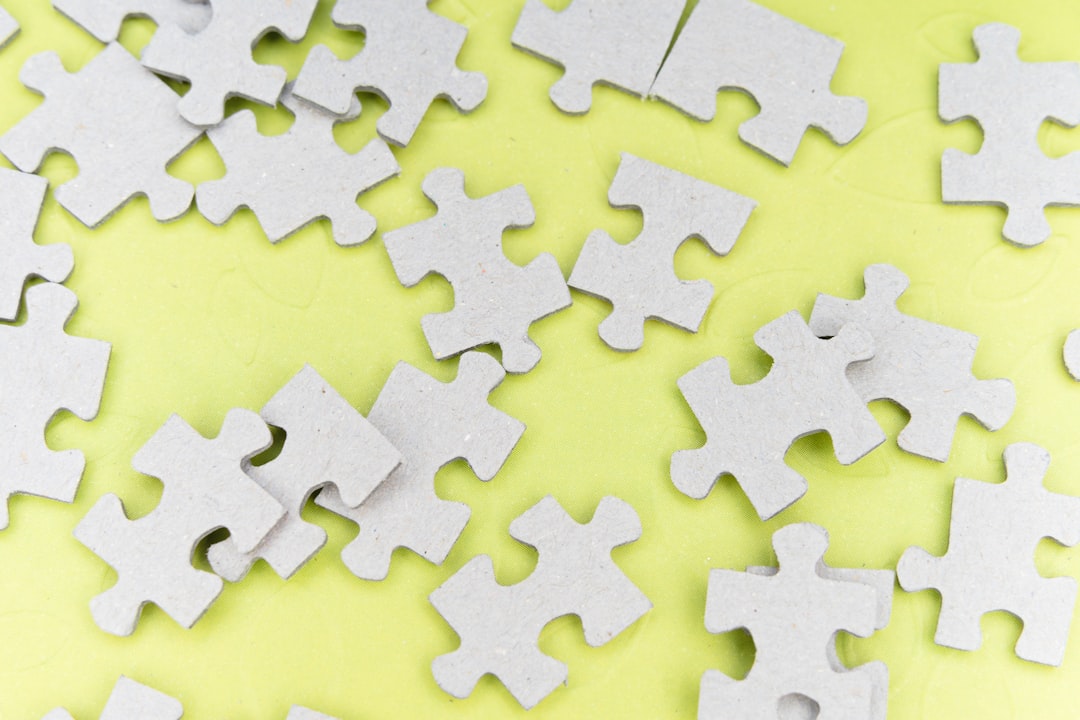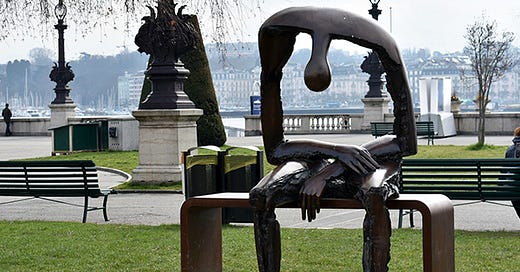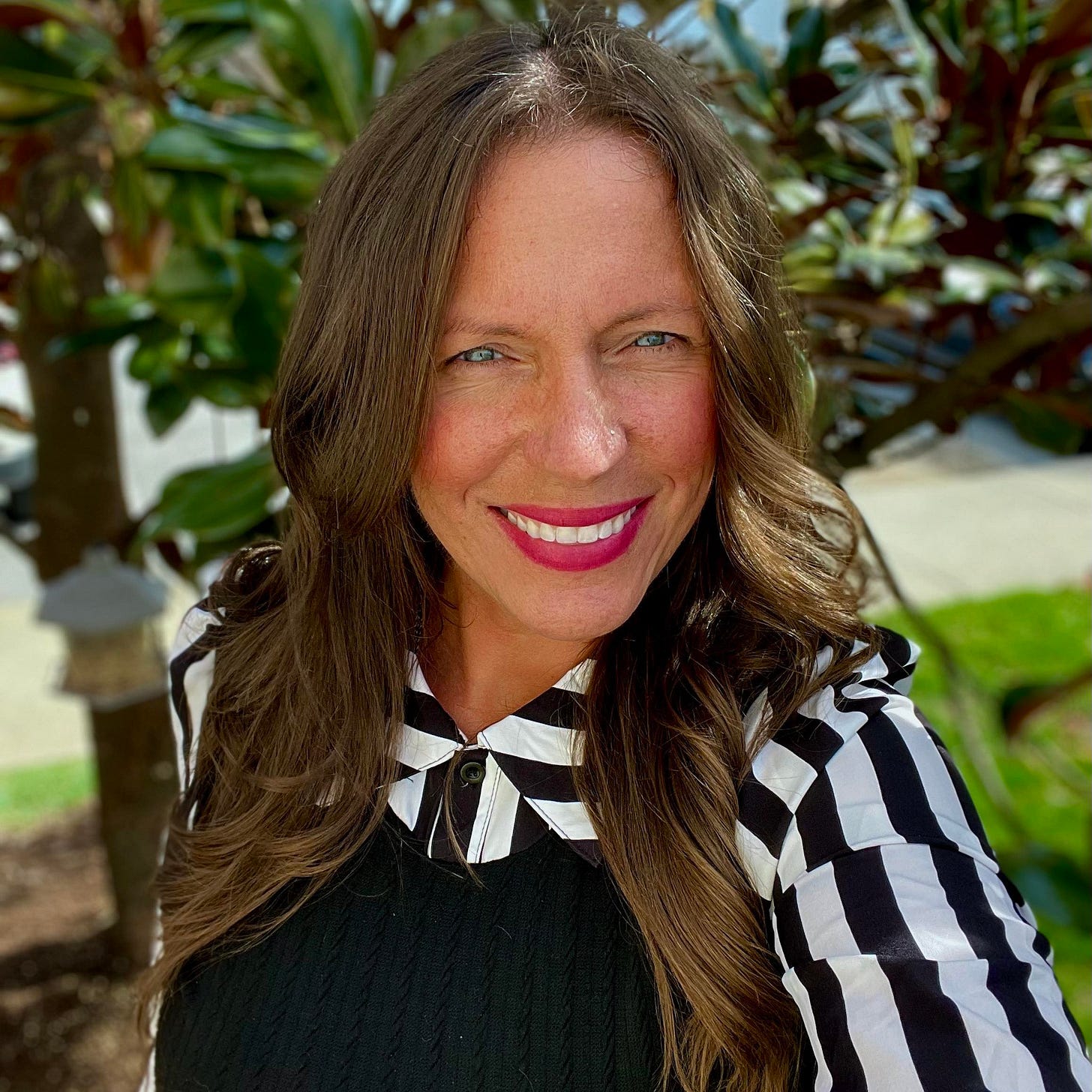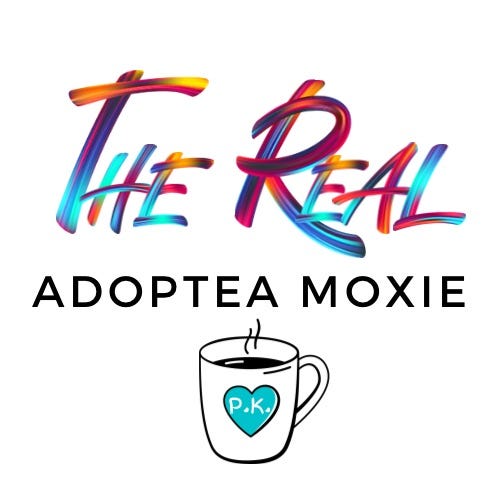Bewildering Adoptee Grief on Infinite Repeat
"I sat with my anger long enough until she told me her real name was Grief." ― C.S. Lewis.
Melancholy - the emptiness that incapacitates us through grief.
Melancholy, a sculpture created by Albert Gyorgy, portrays the void that grief leaves us with. The sculpture depicts a figure made of copper sitting on a bench slumped over, with a giant hole in the center of it. This hole represents the massive void we all feel when we lose someone dear to us, and many people have expressed their appreciation for this sculpture for portraying the exact emotions they feel but perhaps haven’t been able to quite put it into words.
Albert Gyorgy felt intense sadness and isolation from the loss of his wife and went on to create this beautiful piece of artwork as a way to cope. A photo of this sculpture has been shared on Facebook over 200,000 times by various people who’ve suffered a loss in their life. Strangers have united to share their unfortunate experiences with loss and have sympathized with one another. Many people feel they can relate to this artwork in various ways, through grief and mental illness.
Please take a look at the original Facebook post here.
As an adopted person, the first time I saw this sculpture, it astounded me in a way that took me back. Never in this lifetime have I seen something that replicates how it feels to be adopted in such a powerful way. I have always felt like I had an empty hole in my heart, and sometimes I have felt hollow and empty inside, like a walking dead woman. It's taken 48 years to reach the other side of internal acceptance and peace.
So, for my fellow adoptees, how does this sculpture make you feel?
While emerging out of the fog about my adoption experience, coming to terms with all the layers has been many years in the making. I wish I had a road map or a book on what to do or not, but I have been winging it every step.
When I was younger, if I had some tools upfront or resources that helped me, I wouldn't have had such deep sadness and agony along the way. For most of my teen and adult life, anger has been one of the core feelings I have had to learn to navigate, and a lot of the time, I never understood the depths of my anger. Many days when I was younger, it showed up as rage that caused significant turmoil in my life and the lives of those around me.
Consider Reading: Why Love Isn’t Enough of a House Full of Stuff
As I write this article, I wish someone in my childhood and younger years helped me understand grief and how it will always be intertwined in my life in various ways due to my adoption experience. Perhaps they didn't know, but now that adoptees are starting to share their experiences, non-adoptees are willing to learn to understand the adoptee experience more profoundly. One of the first things that non-adoptees must acknowledge is everything we lost before adoption.
Mother’s Day triggers adoptee grief.
Father’s Day triggers adoptee grief.
Birthdays trigger adoptee grief.
Holidays trigger adoptee grief.
Once this is acknowledged, it would be helpful to understand the layers and depths of the loss by listening and learning from adult adoptees. The internet is filled with endless adoptee stories between podcasts, organizations, blogs, websites, etc. There is plenty of information on the internet these days. However, it takes intention and willingness to listen and learn from adoptees.
Consider Reading: Recommended Resources for Adult Adoptees & Adoption Advocates.
Around 2012, I started getting to the deep layers of my adoption experience once I removed the numbing effect of alcohol from my life. This allowed me to face my truth head-on and step into reality. I spent over a decade working on the deep layers.
Adoptee Grief is a natural and normal response to loss that happens before we are adopted. However, it is a complex and personal process that involves a range of emotions, such as sadness, anger, guilt, and confusion. Grief can be triggered by various types of loss, including the death of a loved one, the end of a relationship, the loss of a job, or a significant change in life circumstances. In addition, being separated from our biological mothers is a profound trauma that impacts all adoptees differently.
Grief is a process of learning to live without someone or something important to us, and it can take time and effort to work through the feelings of grief. However, while grief can be challenging and painful, it is also an opportunity for growth and healing, leading to a deeper understanding of ourselves and our place in the world.
Complex Grief is a type of grief many adoptees experience. It is also known as prolonged grief disorder and is a type of grief that lasts longer than usual or becomes more intense over time. It is characterized by intense and persistent feelings of sadness, guilt, anger, and/or anxiety that interfere with daily functioning.
Genealogical bewilderment is a term used to describe the psychological implications that adoptees experience due to the lack of information about our biological families and heritage. All the missing pieces to our puzzle matter; when our truth is hidden, it only adds to our pain.

We can't heal when we don't know what we are healing from.
#secrecy #lies #adoption
In contrast, grief is a natural response to all an adoptee loses. While typical grief can be intense and long-lasting, it usually subsides over time, allowing the person to move forward with life.
Conversely, complex grief tends to be more severe and long-lasting, often lasting for months or even years and sometimes an entire lifetime. Unfortunately, there is no timeframe for grief or complex grief or how long they last.
Adoptees experiencing complex grief may have difficulty accepting the loss, experience intense emotional pain, trouble sleeping or concentrating, and isolate themselves from others. They may also experience physical symptoms such as fatigue, headaches, or digestive problems.
While grief is a natural and expected response to adoptee loss, complex grief is a more severe and prolonged form of grief that may require professional support and treatment. Unfortunately, complex grief is what many adoptees experience, along with genealogical bewilderment.
When adoptees know complex grief before we know love, it changes things.
Adoptees and those who know and love them don't always understand that the grief they are experiencing can manifest in unhealthy behavior patterns, anger, rage, substance use issues, obsessive and compulsive behaviors, and more. However, once I made the connection that what I felt below the surface was grief, I could accept it would be here to stay and move forward with my life.
You must feel it to heal it; the only way out is through it.
With positive culture & toxic positivity being rampant in our society, it’s hard for some adoptees to be transparent without being looked at as negative or Debbie Downers. It’s next to impossible to find someone in your life who will allow you the space to be honest and share deep feelings without being labeled a certain way.
Gaining a deeper understanding of grief was a key to my adoptee healing journey. So, I started researching grief and learning as much as I could. I recommend that all adoptees, birth mothers, and adoptive parents become grief experts —and anyone who knows and loves an adoptee.

Every tear I cried allowed me to feel the deep feelings about the loss I experienced before I was adopted. As soon as I accepted grief would be a part of my life forever, I started to heal. My sadness started to subside once I learned to process my grief healthily. When I filled my wellness toolbox with tools that worked for me to process my adoptee grief and apply them to my life, my tears started to dry up.
Acceptance is critical, but we can’t accept anything if we don’t know what we are accepting. This is why every adoptee deserves to know the truth about who they are and where they come from. We are all unique individuals with differences; what works for some won’t work for others. However, it’s up to us to find what works by trying and never give up seeking our truth.
If you are an adoptee who has made it this far, please know that you aren't alone, and how you feel is normal for a not-normal situation. Nothing is normal about being separated from our birth mothers and families at the beginning of life.
I have compiled a list of recommended resources for adoptees and advocates. You can find it here: Recommended Resources for Adult Adoptees and Adoption Advocates.
Thank you, I love you!
Understanding is Love,
Pamela A. Karanova
ASK ME ANYTHING COLUMN
Each month, all subscribers receive an “Ask Me Anything” newsletter — which will answer one or two adoptee-related questions from paid subscribers. Think: What adoptee healing tools have been the most valuable to you? How have you navigated the grief and loss process? What made you want to search for your biological family? How was your reunion once you searched? Do you regret searching? If you have a question for me, please email it to: pamelakaranova@gmail.com
Here are two recent questions:
When Speaking to Adoptive Parents About Adoption
Ways to Better Understand and Support Adopted Teens
Here are a few articles I recommend reading:
100 Heartfelt Transracial Adoptee Quotes that Honor the Truth of Adoption by Pamela A. Karanova & 100 Transracial Adoptees Worldwide
What Are the Mental Health Effects of Being Adopted? By Therodora Blanchfield, AMFT
10 Things Adoptive Parents Should Know – An Adoptee’s Perspective by Cristina Romo
Understanding Why Adoptees Are At A Higher Risk for Suicide by Maureen McCauley | Light of Day Stories
Toward Preventing Adoption- Related Suicide by Mirah Riben
Relationship Between Adoption and Suicide Attempts: A Meta-Analysis
Reckoning with The Primal Wound Documentary with a 10% off coupon code (25 available) “adopteesconnect”
Still, Grieving Adoptee Losses, What My Adoptive Parents Could Have Done Differently.







Thank you, Pamela. So much of what you said resonates with me. My teen years were particularly hard for me, and like you said, tools and resources, would’ve been really helpful. The grief can be overtaking. But, I am pressing on and moving forward with new adoptee friends and great support and resources now. Thank you again for your raw truth!!